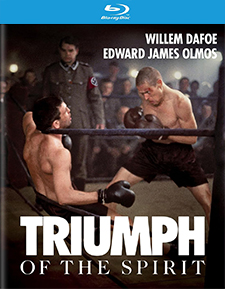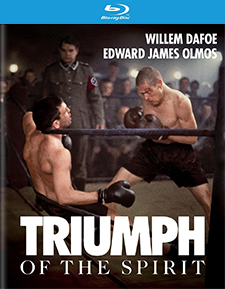Triumph of the Spirit (Blu-ray Review)

Director
Robert M. YoungRelease Date(s)
1989 (November 12, 2024)Studio(s)
Nova International/Triumph Releasing (Kino Lorber Studio Classics)- Film/Program Grade: C-
- Video Grade: B+
- Audio Grade: B+
- Extras Grade: C-
Review
After the massive success of Platoon, Hollywood understood that audiences were receptive to more than your classic war film of upbeat heroism and will power. Producer Arnold Kopelson (Platoon) didn’t stop at the terrifying nightmare fuel of the Vietnam War and turned his focus to the Holocaust with Robert M. Young’s Triumph of the Spirit. Young wasn’t fully behind depicting the Holocaust, noting that the event itself was far too huge to fully capture. But when he was approached with a script that prioritized empathy and humanity within Auschwitz’s suffocating walls, off the film went into production with Willem Dafoe (Platoon) attached. The result is a lot more maudlin than Young and Kopelson’s original intentions, yet it’s still a stunner to look at in its lavish re-creation of concentration camps, plus much of the film was shot on location at Auschwitz. Dafoe is game for round after round of misery and an easy performer to invest in, with his abnormal, intense face hiding deep internal pain. That said, Young’s direction is lost within re-creation, which does a huge disservice to the characters in the story.
Triumph of the Spirit follows Salamo Arouch (Dafoe), a dock worker living in Thessaloniki, Greece before the start of WWII. Along with his Poppa (Robert Loggia), Momma (Zofia Saretok), his brother Avram (Costas Mandylor) and girlfriend Allegra (Wendy Gazelle), the Nazis invade in 1943 and take them all to Auschwitz. Salamo’s passion for boxing reignites when he’s forced by SS soldiers to fight other prisoners for their entertainment. As Salamo watches all of his family and friends beaten and killed around him, his dogged determination as a boxer keeps his will to live from being suppressed.
The main issue with Triumph of the Spirit was clearly identified by Roger Ebert from his February 1990 review of the film, in which he said: “Triumph of the Spirit goes to great lengths to establish a basis in fact.” The problem is that “basis” takes away from much of the dramatics, forcing audiences to endure a miscalculated approach to showcasing a survivor’s story. And because much of the film is slavishly devoted to re-creating atrocities in Auschwitz, we’re always asked to believe in a boxer’s struggle right after witnessing absolute misery. Salamo’s ascension as a boxer is set against the degradation of the camp, and inevitably we bear witness to Nazis not knowing what to do after they’ve lost the war. For a film that doesn’t want to draw any tidy conclusions, it coasts on the fact that we know everything that’s going to happen because it’s part of history. It’s an uneasy balance that Young doesn’t have the reflexivity to avoid, thus the film falls flat when it should land punches.
That isn’t to take away from Dafoe’s terrific performance, which carries much of the film in ways that it can’t carry its own main character. Dafoe is at his sinewy best as a man who fought his way through Auschwitz until the war ended and was finally released, but is it a triumph? Dafoe certainly plays the character as if his ability to box just steals the humanity away from him, becoming an emaciated husk that’s still forced to fight against his own kind to survive. At that point, is the audience complicit in watching him beat down other prisoners before they’re carried off to the gas chamber? Young’s direction is too enamored with re-creation to know how much emotive power Salamo’s journey carries.
All in all, the fictional formula for Triumph of the Spirit is miscalculated and takes away from the real-life story of Salamo Arouch. This is an infinitely sad story that draws no easy conclusions about the atrocities of the Holocaust, and the vivid recreation of it only lays bare that the film doesn’t have the capabilities to treat such a massive, despairing subject with grace and understanding.
Triumph of the Spirit was shot spherically on 35mm using Aaton 35-III and Panavision Panaflex Gold cameras with Panavision Primo lenses. Framed in the original 1.85:1 aspect ratio, Kino Lorber Studio Classics presents the film in 1080p with an AVC encode that offers data rates that hover between 35-45Mbps for the majority of the presentation. No notes about the source used for this transfer have been provided, but to my eyes this is a very handsome showcase that looks as close to a 4K source as possible. Grain is well-refined amidst a bright and strong color palette, bringing out the most in facial, clothing and environmental textures you’d expect from a rock-solid transfer like this. The film itself doesn’t downplay any of its sets to align with the usually downbeat, moody and color-muted re-creations of Auschwitz seen in other films. Black levels are nice and inky as well, with no black crush present throughout the presentation. Source looks to be in incredible condition with no damage to note.
As for audio, we’re given an English 2.0 DTS-HD Master Audio mix (with optional subtitles in English SDH) that is similarly in pristine condition with no damage to note of. As much as I expected this to be a front-heavy track, I was surprised by how much the soundscape moves between the two stereo channels. This isn’t simply a mono upmix, as you can hear the score and dialogue move with the camera in certain scenes.
Triumph of the Spirit comes home from Kino Lorber Studio Classics in a single-disc BD-50 Blu-ray package housed in their standard blue Amaray casing and offering an o-card slipcover with the same art as the case sleeve. Bonus features include:
- Audio Commentary by Manuela Lazic
- Theatrical Trailer (SD – 1:58)
On the supplements end of this release, we’re provided with a sparse selection of special features, similar to many Kino Lorber Studio Classics releases. The commentary is interesting because film critic Manuela Lazic has many, many issues with the film and understandably so, however it has the adverse effect of taking away from engaging with what’s happening within the film when those issues arise in the track. That said, Lazic provides historical anecdotes to position the film up against the actual truth of Salamo Arouch.
Triumph of the Spirit can’t get out of its own way, much to the detriment of the real-life atrocities it depicts. Willem Dafoe anchors the film in ways the direction cannot, but luckily we now have a great new Blu-ray from Kino Lorber Studio Classics for fans of the film to watch. The 1080p transfer is rock-solid and the stereo track makes good work of the bombastic score.
- Sam Cohen
(You can follow Sam on social media at these links: Facebook, Instagram, and Letterboxd.)

